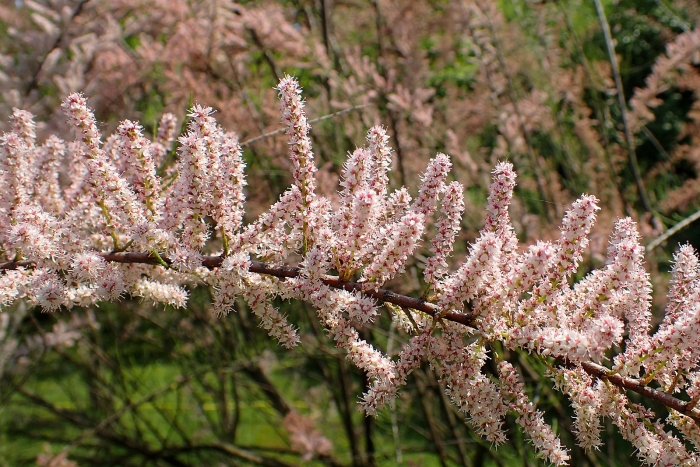Smallflower Tamarisk
(Tamarix parviflora)
Smallflower Tamarisk (Tamarix parviflora)
/
/

Krzysztof Ziarnek, Kenraiz
CC BY-SA 4.0
Image By:
Krzysztof Ziarnek, Kenraiz
Recorded By:
Copyright:
CC BY-SA 4.0
Copyright Notice:
Photo by: Krzysztof Ziarnek, Kenraiz | License Type: CC BY-SA 4.0 | License URL: https://creativecommons.org/licenses/by-sa/2.0 | Uploader: Kenraiz | Publisher: Wikimedia Commons |



































Estimated Native Range
Summary
Tamarix parviflora, commonly known as smallflower tamarisk, is a deciduous shrub or small tree native to dry areas, saline soils, and riparian zones in the Eastern Mediterranean region. It typically grows up to about 5 meters tall and is characterized by its slender, feathery foliage and dense, plume-like inflorescences. The branching twigs are covered in tiny, scale-like, linear leaves no more than 2 or 3 millimeters long, which can give the plant a grayish-green appearance. The inflorescence is a dense spike, with each tiny flower having four delicate pink petals, blooming from late spring to early summer. The flowers are not particularly showy but can add a soft texture to the landscape.
Smallflower tamarisk is valued for its ability to tolerate harsh conditions, including high salinity and drought, making it a suitable choice for challenging sites such as coastal areas and roadside plantings. It is also used for windbreaks and erosion control due to its dense growth habit. In cultivation, it requires full sun exposure and can thrive with low to medium amounts of water, preferring soils with medium drainage. While it is adaptable to various soil types, it does best in sandy or loamy soils. Gardeners should be aware that Tamarix species can become invasive in some regions, outcompeting native vegetation, and should be planted with caution outside of their native range.CC BY-SA 4.0
Smallflower tamarisk is valued for its ability to tolerate harsh conditions, including high salinity and drought, making it a suitable choice for challenging sites such as coastal areas and roadside plantings. It is also used for windbreaks and erosion control due to its dense growth habit. In cultivation, it requires full sun exposure and can thrive with low to medium amounts of water, preferring soils with medium drainage. While it is adaptable to various soil types, it does best in sandy or loamy soils. Gardeners should be aware that Tamarix species can become invasive in some regions, outcompeting native vegetation, and should be planted with caution outside of their native range.CC BY-SA 4.0
Plant Description
- Plant Type: Shrub, Tree
- Height: 10-15 feet
- Width: 8-15 feet
- Growth Rate: Moderate
- Flower Color: Pink
- Flowering Season: Spring
- Leaf Retention: Deciduous
Growth Requirements
- Sun: Full Sun
- Water: Low, Medium
- Drainage: Medium
Common Uses
Bee Garden, Butterfly Garden, Drought Tolerant, Erosion Control, Low Maintenance, Salt Tolerant, Showy Flowers
Natural Habitat
Native to dry areas, saline soils, and riparian zones in the Eastern Mediterranean region
Other Names
Common Names: Salt-Cedar, Small-Flower Tamarisk, Saltcedar, Tamarisk, Tamarix, Small-Flowered Tamarisk, Junitamarisk, Kleinblütige Tamariske
Scientific Names: , Tamarix gallica, Tamarix parviflora, Tamarix cretica, Tamarix rubella, Tamarix lucronensis, Tamarix laxa var. subspicata, Tamarix petteri, Tamarix parviflora var. rubella,
GBIF Accepted Name: Tamarix parviflora DC.